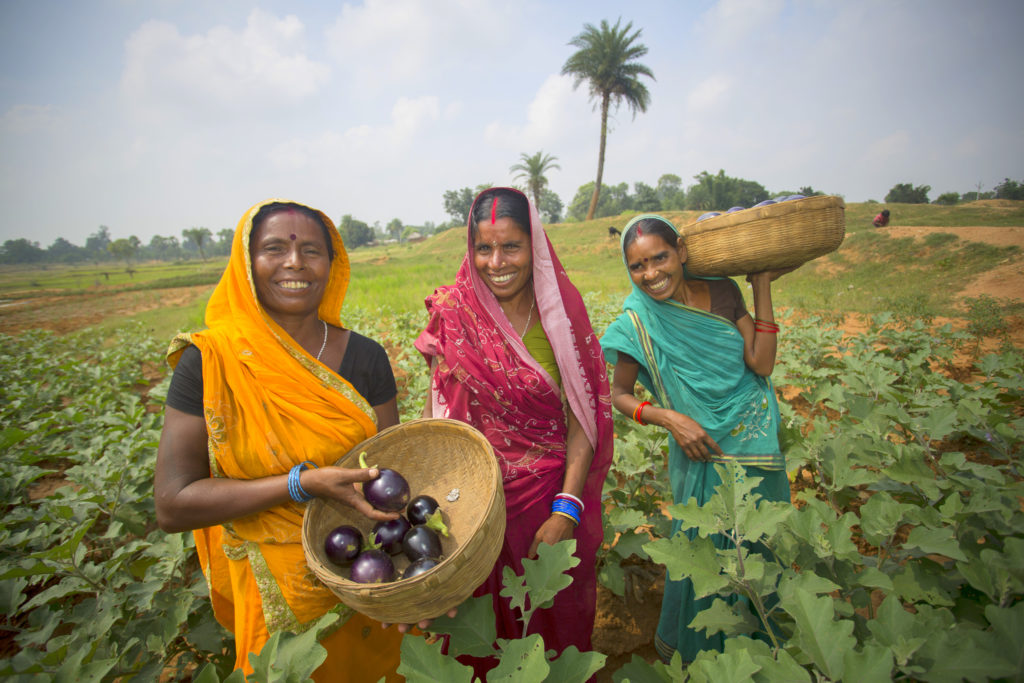Due to high costs of devices and data, digital literacy rates, and social norms around access and use of digital devices, men are 52 percent more likely to be online than women in low-income countries. In part one of our interview with Salonie Muralidhara Hiriyur, a consultant with the Self-Employed Women’s Association Co-operative Federation (SEWA), she explained the economic challenges that rural women face in India and how her organization uses co-operatives to connect women to resources and empower them to be decision-makers. In the second part of the interview, she discusses how access to digital data empowers rural women and farmers.
Note responses have been edited for clarity.
Question (Q): How would better access to usable gender data impact SEWA’s mission to holistically empower poor self-employed women, within collectives and co-operatives?
Answer (A): The digital economy is growing but not always reaching rural women, particularly because ownership of mobile phones and access to things like network connectivity are lower in rural areas. Data-based co-operative governance, like SEWA is working on, enables further linkages and access to more sophisticated supply chains, driven by multiple points of inquiry and data, which otherwise these women wouldn’t have.
Data co-operatives also give women more control of their own data. The power of data is really gained when you aggregate it. These women, by being in a co-operative, have aggregated their data and now they’re being able to both control and utilize it for their own benefit.
Q: Rural women face many constraints. How can digital data support rural women to overcome them and remain resilient as new crises emerge?
A: One of the things we saw with COVID-19 and are seeing with climate change is that information isn’t getting through, there are leakages. Technology and data can help block some of those leakages and make the information supply chain better. Rural women in India are the ones least likely to have a phone. There is often a household phone, but the men use it, and women don’t have access. This is where the co-operative comes in, because through it, women are connected to some channel of information and data. Helping these co-operatives to organize more women helps provide them with more information, helping them become more resilient and better prepared.
Another key issue for rural women is reaching resources. In the pandemic this meant medicine, oxygen, sanitizers, and food and with respect to climate change it might mean access to high heat resistant seeds, knowledge of climate friendly irrigation methods, or knowledge about older forms of farming that were inherently climate friendly. But in this economy, there are a lot of companies who are pushing seeds that require a high amount of fertilizer and other inputs. Through co-operatives and better access to data and information, we can make sure that the farmers are not being exploited and that they’re not being forced to choose something that is going to destroy their land. It goes back to better access to information and resources so women can be better prepared.

Q: What is the Megha data cooperative effort and why is it important?
A: Through a three year grant we have from the Canadian Institute for Advanced Research we’re trying to build a blueprint or a toolkit to enable women farmers to create a platform which helps them address all these problems that we’ve talked about. And we’re building it through the use case of two agriculture cooperatives that are linked to SEWA. One is Megha which is a co-operative of 1,001 women farmers. These are all tribal and indigenous women that have been running this cooperative successfully for 12 years.
We are co-designing a digital platform with the members because policies and tools should be designed with women, not for women. The platform will link individual farmers and their co-operatives to the agriculture information supply chain. It will connect them to information on inputs (seeds, tools, fertilizer) and markets (What is the price of the crop? What should I grow?) and link them directly to the market.
We don’t know what this will look like yet because the women will tell us what it should look like based on their lived realities. It will mostly likely take a hybrid form, with hyper-local centers that are aggregating data and allowing a two-way channel for data to flow through, that will feed back to the co-operative. The co-operative can then decide on what resources and input information to give to the farmers.
Currently, we’re trying to figure out what training needs to go into the platform, what are the capacity building needs of the women, what are the financing needs of the women, and what are the market needs of the women. And based on this information, we will be co-designing these specific pieces in the next couple of years. Meanwhile, we are putting this out there in an open-source toolkit because we want it to be accessible to women worldwide.
Q: What about the Megha project makes you excited for the next year?
A: This is something that I don’t think has been done before, not by women farmers, and not in India. Everything we’re doing is new. As we work on the design pieces, the farmers teach me something new every day and force me to unlearn old ideologies every day. That makes me wake up and be excited for work. I truly and fully believe in the co-operative model. What would be exciting is to see the adoption of this in other areas in the global south where the social and solidarity economy, like data governance co-operatives, would change the way women are able to engage with themselves as workers, with their households, with the market, and with the state.
